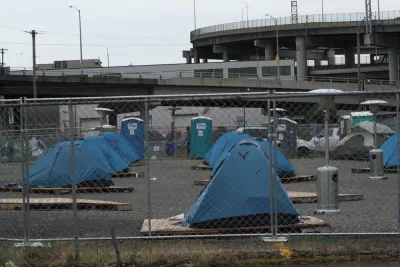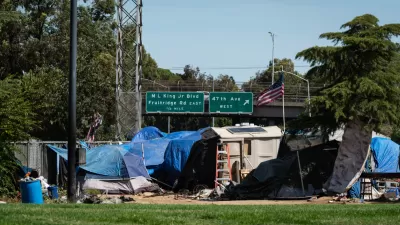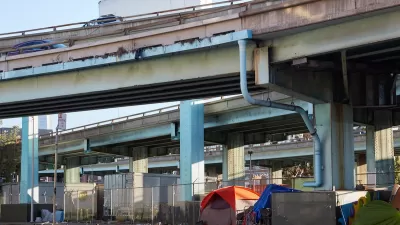Both West Coast cities are preparing to criminalize sleeping on public streets, claiming new shelter beds will provide enough resources for their unhoused populations.

In a housing brief on Next City, Roshan Abraham outlines two proposals aimed at further criminalizing homelessness in Portland, Oregon and Sacramento. The two cities are poised to ban sleeping on public streets if two proposals are approved by Portland’s city council and Sacramento voters.
The Portland proposal calls for increased shelter capacity and would force unsheltered people to move to city-run “alternate camping sites,” which would accommodate roughly 1,500 people, around half of the city’s unhoused population. “Oregon Live reports that the city council supports the resolutions, but getting them passed would not automatically lead to a camping ban or new shelter space, as resolutions are non-binding and the funding details would have to be worked out in the next budget cycle.”
In Sacramento, a ballot measure will let voters decide whether to make camping on public streets a misdemeanor. “The measure also allows “any resident harmed” by a violation of the measure to begin proceedings with the city to have someone removed.” If the measure passes, it may not be enforceable due to a clause that requires cooperation with the county.
Critics say cities are engaging in “legal gymnastics” to leverage new shelter space as “a pretext for criminalization,” with Abraham noting that “many cities rush to roll out shelter space prior to camping bans in order to comply with the 2019 decision in Martin vs. Boise, which barred jurisdictions from issuing public sleeping bans when there was not sufficient shelter space.”
FULL STORY: Housing In Brief: Portland & Sacramento Propose Citywide Camping Bans

Planetizen Federal Action Tracker
A weekly monitor of how Trump’s orders and actions are impacting planners and planning in America.

Maui's Vacation Rental Debate Turns Ugly
Verbal attacks, misinformation campaigns and fistfights plague a high-stakes debate to convert thousands of vacation rentals into long-term housing.

San Francisco Suspends Traffic Calming Amidst Record Deaths
Citing “a challenging fiscal landscape,” the city will cease the program on the heels of 42 traffic deaths, including 24 pedestrians.

Amtrak Rolls Out New Orleans to Alabama “Mardi Gras” Train
The new service will operate morning and evening departures between Mobile and New Orleans.

The Subversive Car-Free Guide to Trump's Great American Road Trip
Car-free ways to access Chicagoland’s best tourist attractions.

San Antonio and Austin are Fusing Into one Massive Megaregion
The region spanning the two central Texas cities is growing fast, posing challenges for local infrastructure and water supplies.
Urban Design for Planners 1: Software Tools
This six-course series explores essential urban design concepts using open source software and equips planners with the tools they need to participate fully in the urban design process.
Planning for Universal Design
Learn the tools for implementing Universal Design in planning regulations.
Heyer Gruel & Associates PA
JM Goldson LLC
Custer County Colorado
City of Camden Redevelopment Agency
City of Astoria
Transportation Research & Education Center (TREC) at Portland State University
Jefferson Parish Government
Camden Redevelopment Agency
City of Claremont





























